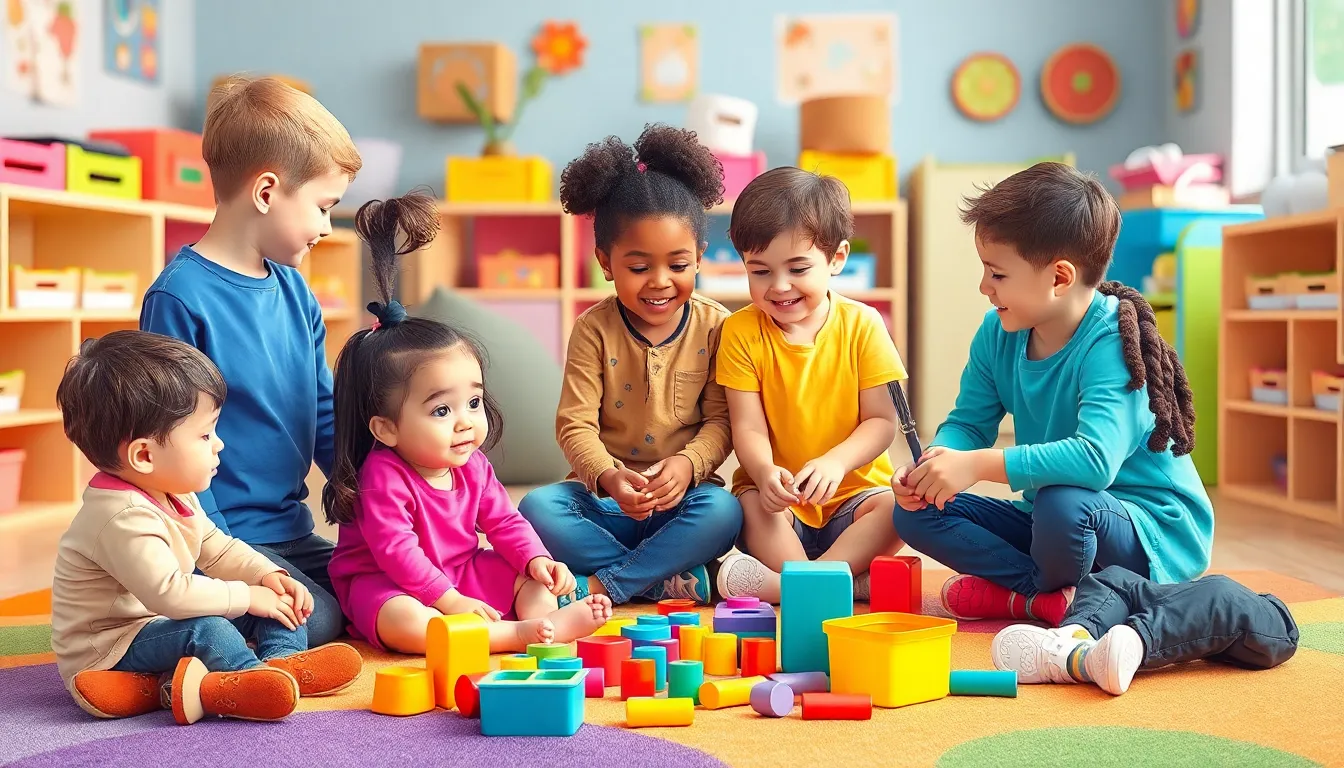Imagine a classroom where every child, regardless of their abilities, learns and plays together. Preschool inclusive education isn’t just a trend; it’s a transformative approach that celebrates diversity and fosters a sense of belonging from the very start. In a world where teamwork makes the dream work, why not let our youngest learners kick off their educational journey in an environment that embraces everyone?
Table of Contents
ToggleOverview of Preschool Inclusive Education
Preschool inclusive education integrates children of all abilities within the same learning environment. This method fosters social and academic growth by allowing diverse experiences. Inclusive classrooms support children with disabilities alongside their typically developing peers. Students benefit from varied teaching strategies tailored to meet individual needs.
Teachers in inclusive settings utilize techniques that ensure all children participate fully. Collaborative learning activities enhance communication skills and promote empathy among young learners. Research indicates that inclusive practices boost self-esteem and academic performance. A significant percentage of children in inclusive classrooms develop positive relationships with their peers.
Classroom activities might include group projects, play-based learning, and interactive discussions. These activities encourage engagement and facilitate peer learning. Various resources, such as adaptive technologies and sensory materials, aid in meeting individual needs. Parents and caregivers also play a vital role in this educational model.
Partnerships between schools and families create a supportive community. When families are involved, children demonstrate higher levels of motivation and excitement for learning. Specialized training for educators ensures they are equipped with the necessary skills to address diverse learning requirements.
Preschool inclusive education not only prepares children for future academic challenges but also cultivates essential life skills. Developing an understanding of diversity early on leads to more compassionate individuals. Lastly, this inclusive approach creates a sense of belonging that fosters lifelong friendships.
Importance of Preschool Inclusive Education

Preschool inclusive education plays a vital role in fostering a supportive environment for all children. This approach cultivates not just academic growth but also essential social skills.
Social Benefits
Social benefits abound in preschool inclusive education settings. Children with diverse abilities learn to interact with peers, fostering empathy and respect. Positive relationships develop among students as they collaborate on activities. Sharing playtime enriches their experiences and enhances communication skills. Inclusion nurtures a sense of belonging, reducing stigma and promoting acceptance. Research indicates that friendships formed in inclusive classrooms often last beyond preschool, encouraging lasting social connections.
Academic Benefits
Academic benefits are significant in inclusive preschool environments. Teachers use varied instructional strategies to accommodate different learning styles. This approach enhances overall engagement in learning activities. As a result, all children show improved academic performance and confidence. Research reveals that inclusive classrooms support higher learning outcomes, particularly for children with disabilities. Diverse interactions stimulate critical thinking, creativity, and problem-solving skills in learners, equipping them for future educational challenges.
Models of Preschool Inclusive Education
Preschool inclusive education features various models that enhance learning for all children. These models create environments where both children with disabilities and typically developing peers thrive together.
Integrated Classrooms
Integrated classrooms consist of children with diverse abilities learning side by side. Teachers adapt lessons to accommodate different learning styles and abilities. Emphasizing peer interactions, these classrooms foster relationships that encourage social skills and collaboration. Research shows that inclusive classrooms lead to improved academic outcomes, particularly for children with disabilities. They also promote engagement and participation through group activities, hands-on projects, and play-based learning experiences.
Specialized Support Services
Specialized support services provide tailored assistance to meet individual learning needs. Services include speech therapy, occupational therapy, and social skills training. Such support ensures children receive the necessary resources for their development. Collaboration among educators, specialists, and families enhances learning experiences. Regular assessments help monitor progress, allowing for adjustments in support plans. Access to these services significantly contributes to positive educational outcomes, promoting both academic success and social interaction skills in an inclusive setting.
Challenges in Implementing Preschool Inclusive Education
Implementing preschool inclusive education poses several challenges that can impact its effectiveness. These challenges include funding, resources, and the training and support provided to educators.
Funding and Resources
Funding presents a significant challenge for preschool inclusive education. Many schools face constraints in budget allocation, impacting their ability to provide necessary resources. Limited access to specialized tools, such as adaptive technologies, hampers efforts to support children with diverse needs. Additionally, financial support often determines the availability of trained staff and support services, which are vital for creating a balanced learning environment. Urban and rural settings experience this challenge differently, with urban areas sometimes benefiting from greater funding opportunities, while rural locales may struggle to find adequate resources.
Training and Support for Educators
Training for educators plays a critical role in the success of preschool inclusive education. Many teachers lack access to specialized professional development focused on inclusive practices. Without this training, educators may feel unprepared to address the diverse needs of their students effectively. Support systems also influence teacher confidence and effectiveness; regular mentorship opportunities and collaborative planning time enhance teachers’ abilities to implement inclusive strategies. Schools that prioritize ongoing training and establish strong support networks foster more inclusive classrooms, which improves learning experiences for all children.
Best Practices for Successful Inclusion
Implementing successful inclusive education practices in preschools requires comprehensive strategies. Establishing a welcoming classroom environment significantly enhances children’s comfort levels. Utilizing differentiated instruction accommodates varying learning styles and needs, benefiting all students. Fostering collaboration among teachers, specialists, and families ensures tailored support for each child’s development.
Incorporating social skills training helps young learners develop empathy and respect for their peers. Providing access to adaptive technologies can enhance participation, making learning accessible for everyone. Conducting regular assessments allows educators to monitor progress and adjust strategies as needed, ensuring children meet their developmental milestones.
Encouraging peer interactions through group activities stimulates friendships among students of different abilities. Establishing routines promotes predictability, lowering anxiety for children adjusting to inclusive settings. Offering professional development opportunities prioritizes teacher training in inclusive practices, equipping them with essential skills for diverse classrooms.
Engaging parents and caregivers in the educational process strengthens community ties and boosts children’s motivation. Creating resource-rich environments that include visual aids, manipulatives, and sensory materials stimulates learning and engagement. Maintaining open channels of communication encourages feedback, helping schools improve their inclusive approaches.
Consolidating resources among schools further enhances collaborative practices within communities. Implementing these best practices leads to improved academic outcomes, social skills, and lasting relationships for children in preschool inclusive environments.
Preschool inclusive education stands as a vital foundation for fostering growth in children of all abilities. By embracing diversity and promoting collaboration educators create enriching environments that benefit every student. The positive impact on social skills and academic performance highlights the importance of inclusive practices in shaping future-ready learners.
As schools continue to prioritize inclusive education they pave the way for lasting friendships and essential life skills. With the right support and resources the benefits extend far beyond the classroom setting. Investing in inclusive practices not only enhances individual potential but also cultivates a community where every child feels valued and connected.



